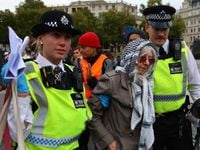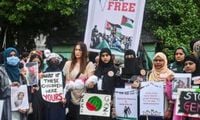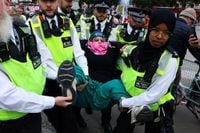On October 5, 2025, the United Kingdom’s Labour government announced sweeping new police powers aimed at curbing repeat protests, especially those that have gripped major cities for weeks and stoked fears among religious minorities. The move, which Home Secretary Shabana Mahmood described as an effort to balance the right to protest with public safety, comes after a tumultuous week that saw nearly 500 arrests at a pro-Palestinian march in London and a terrorist attack on a Manchester synagogue during Yom Kippur, the holiest day in the Jewish calendar.
According to The Economic Times, the new measures will allow police to consider the cumulative impact of previous protests at a given site. If demonstrations have caused repeated disorder over several weeks, officers will have the authority to instruct organizers to move their events elsewhere. Breaches of such conditions could result in arrest and prosecution. The Home Office clarified that these changes would be incorporated as amendments to the Public Order Act, while additional provisions are being considered in the Crime and Policing Bill, which is currently moving through Parliament.
“The right to protest is a fundamental freedom in our country. However, this freedom must be balanced with the freedom of their neighbours to live their lives without fear,” Mahmood stated in an official release, as reported by National Post. She further emphasized, “These changes mark an important step in ensuring we protect the right to protest while ensuring all feel safe in this country.”
The announcement follows a period of heightened tension. On October 2, a synagogue in Manchester was attacked, sending shockwaves through the Jewish community and prompting both Mahmood and Prime Minister Keir Starmer to urge the cancellation of a major pro-Palestinian demonstration scheduled for the following weekend. Despite these appeals, the protest went ahead in Trafalgar Square on October 4, leading to mass arrests and renewed debate over the government’s handling of public order and minority protection.
Mahmood acknowledged the deep sense of vulnerability felt by British Jews in the wake of recent events, telling the BBC, “Large, repeated protests can leave sections of our country, particularly religious communities, feeling unsafe, intimidated and scared to leave their homes. This has been particularly evident in relation to the considerable fear within the Jewish community, which has been expressed to me on many occasions in these recent difficult days.” She admitted that many in the Jewish community were “justified in asking for more from their government.”
The Daily Mail noted that the new powers will enable chief constables to consider not only the frequency of protests but also their impact on particular neighborhoods or communities. If necessary, police could require organizers to reroute or even cancel marches. Organizers who flout these instructions could face up to six months’ imprisonment or a fine of £2,500, while participants might also be fined. The government has indicated that these measures will be brought forward as an amendment to the ongoing Crime and Policing Bill, which was first published in March and is now under debate in the House of Lords.
The crackdown is not limited to rerouting demonstrations. The Crime and Policing Bill includes a host of other measures: banning the possession of fireworks, flares, and other pyrotechnics at protests; criminalizing the climbing of specified war memorials; and banning the use of face coverings to conceal one’s identity at protests designated by police. These steps, according to the Home Office, are designed to give law enforcement the tools they need to maintain order and deter disrespectful or dangerous behavior.
The government’s announcement has triggered a flurry of reactions across the political spectrum. Jewish leaders, while expressing cautious support for the new measures, have also voiced frustration over what they see as a delayed response. Phil Rosenberg, president of the Board of Deputies of British Jews, remarked at an event marking the anniversary of the October 7 Hamas attacks that some pro-Palestinian marchers had been “almost gloating” over the Manchester synagogue attack.
Deputy Prime Minister David Lammy, standing alongside Mahmood at a Manchester vigil, was heckled by attendees demanding stronger action. Mahmood, in a candid BBC interview, said, “I fully accept that people are grieving, they are upset and they want more from their government. They are justified in asking for more.” She also pointed to a series of recent incidents—including a mosque arson and near-misses around migrant hotels—as evidence of the complex and volatile environment facing both police and policymakers.
Yet, not everyone is convinced the government’s approach is the right one. Civil liberties groups and non-profits have raised the alarm, arguing that the new powers could erode fundamental rights. Will McCallum, co-executive director of Greenpeace U.K., called the proposals “a dangerous step towards authoritarianism,” warning, “We are repeatedly told that the right to protest is ‘a cornerstone of our democracy’ and yet in the last few years it has been corroded to the point of collapse.” Silkie Carlo of Big Brother Watch described the plans as “alarming,” suggesting they represent a cynical attempt to suppress dissent at a time when people across the political spectrum are exercising their freedom to assemble.
Legal challenges may also be on the horizon. As The Daily Mail reported, a previous attempt by former Home Secretary Suella Braverman to allow police to consider the “cumulative impact” of protests was struck down by the High Court in 2023, a decision upheld by the Court of Appeal earlier this year. Whether the government’s new approach will withstand judicial scrutiny remains to be seen.
Meanwhile, protest organizers are vowing to escalate their actions in response to the crackdown. Defend Our Juries, a group that has led demonstrations against the prohibition of Palestine Action, announced plans for a “major escalation” should the new policy be implemented.
For the Labour government, the stakes are high. The UK recently recognized Palestine as a state, and public opinion is sharply divided over the ongoing Israel-Gaza conflict and immigration policy. While most recent marches have been peaceful, critics argue that intimidation, antisemitic slogans, and public disorder have become too common to ignore.
As the government reviews existing legislation and prepares to roll out these new powers, the country finds itself at a crossroads—torn between the imperative to safeguard public safety and the enduring value of protest as a democratic right. For many, the coming weeks will be a test not just of law and order, but of the very character of British democracy.



